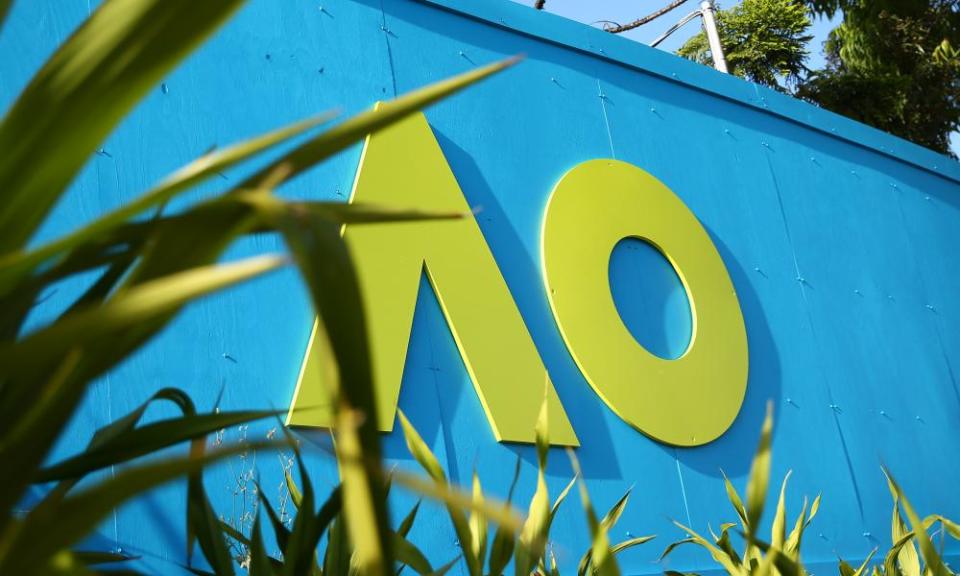Roberto Bautista Agut likens Australian Open quarantine to being in prison 'but with wifi'

Spanish tennis player Roberto Bautista Agut has likened Australian Open quarantine in Melbourne to being in prison and laid the blame solely with the Victorian government.
Frustration and confusion continues unabated in the build-up to the season’s first major, starting on 8 February, with some 72 players and staffers in lockdown in Melbourne following six positive Covid-19 cases among the entourages arriving to Australia on 17 charter flights in recent days.
Related: Australian Open: how Covid is shaping the tennis tournament – explainer
While many players have transformed their hotel rooms into makeshift training centres, the overall sentiment has been one of disquiet and apprehension about potential injury and form ramifications of two weeks with no court practice.
Bautista Agut was the latest to voice concern on Tuesday, drawing parallels between hotel quarantine and being behind bars.
“It’s the same, but with wifi,” the world No 13, a semi-finalist and quarter-finalist at 2019 Wimbledon and Australian Open respectively, told Israeli news channel Sport 5. “These people have no idea about tennis and about practice courts, and it’s a complete disaster. The control of everything isn’t Tennis Australia, it’s with the government.
“You can work in the room but it’s not the same. I feel very, very tight and I cannot imagine staying two weeks like this. It’s really, really tough. I will have to work a lot mentally.”
The situation has sparked suggestions organisers should consider shortening men’s matches to best of three sets, instead of the traditional five, to offset the disadvantage to players in hard quarantine.
But tournament director, Craig Tiley, rejected the notion out of hand on Tuesday, despite acknowledging the lockdown meant preparation was “not an even playing field”.
“We are a grand slam at the end of the day,” Tiley told the Nine Network. “Right now, three out of five sets for the men and two out of three sets for the women is the position we plan on sticking to.
“In order for us to pull this off, we’ve had to do it with great partnership with quarantine Victoria, with the Victorian government and that is working really well. The two weeks with the players and 72 of them being in a hard lockdown, we are providing them with all sorts of exercise equipment in their rooms.
“They can be creative on how they use the dressers, the beds for exercise, and we have seen on social media some really interesting ideas. And then they are going to come out after 14 days in their room and we will give them some time to prepare and that is why we had that buffer week, in the event that this was going to happen.”
Tiley said tournament organisers were considering other avenues to “to try to even it up as much as possible”.
Kevin Roberts, professor of exercise science at the University of South Australia, said that would be difficult, citing the “physiological and biochemical decay” induced by significant changes to training schedules and environments. This, he said, presents in the form of reduced cardiovascular capacity, decision-making speed and accuracy, and an underpreparedness to adjust to the extreme temperatures commonly seen in Melbourne grand slam.
“Perhaps most critical is the fact that players are now in controlled, air-conditioned rooms, 24 hours a day,” Roberts said. “Exposure to hot environments is essential for players to maintain enhanced capacity to regulate their bodies under very hot court conditions.”
Some players may yet get a reprieve after Victorian premier, Daniel Andrews, on Tuesday said the positive Covid-19 test results that sparked the hard lockdown may be reclassified as cases of viral shedding.
Nevertheless, Tiley said quarantine “is the contribution” affected players must make “to get the privilege of, when they do come out, to compete for $80m in prize money”.
He labelled the six Covid cases as a low figure given 1,200 coronavirus tests have been carried out in Melbourne over the past five days.
“There was going to be an expectation to have several positive cases,” he said. “But now we’re in a position where they’re in lockdown, designed to protect the community.”
Tiley also defended Djokovic’s reported appeal, via a wishlist, for organisers to ease restrictions, a move that prompted Nick Kyrgios to call the world No 1 “a tool” on Twitter.

 Yahoo Finance
Yahoo Finance 